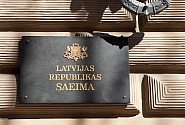
On Thursday, 16 June, the Saeima passed in the final reading a law that provides for the dismantling of the sites glorifying the Soviet and Nazi regimes, including the Monument to the Soviet soldiers—Liberators of Soviet Latvia and Riga from the German Fascist Invaders in the Victory Park in Riga.
The Law on the Prohibition of Exhibiting Items Glorifying the Soviet and Nazi Regimes and Their Dismantling in the Territory of the Republic of Latvia leaves it until 31 July for the Cabinet of Ministers to determine other sites to be dismantled.
The relevant sites will have to be dismantled by 15 November of this year by the municipalities in whose territory they are located. Dismantling will be financed primarily from the financial resources donated by natural and legal persons for this purpose, if any. The rest will be financed in equal amounts from the budgets of the state and the municipality in question.
The Law also contains special provisions for the dismantling of sites, including that the relevant municipality has the right to initiate dismantling regardless of the ownership of the site and the land on which it is located. The Law also covers the special rules for the procurement procedure. Among other things, the relevant municipality and the National Cultural Heritage Board have the right to carry out procurements for implementing the works related to the dismantling of the site without applying the legal provisions regulating public procurement.
The original details or fragments of the dismantled sites with artistic value, architectural quality, or cultural-historical or educational significance will be included in the collection of the Museum of the Occupation of Latvia. The Museum of the Occupation of Latvia will be able to deposit the original parts or fragments of the dismantled sites with a state, municipal, or private accredited museum.
The purpose of the Law is to prevent the denigration of and threat to the values of Latvia as a democracy and a nation state, as well as to express a condemnatory stance against the illegal occupation power, policies, and crimes of both the USSR and Nazi Germany. The purpose of the law is also to promote public understanding of events in the territory of Latvia during World War Two and the post-war period, thus strengthening public historical memory, as well as ensuring the restoration of historical justice by preventing false, inaccurate, and biased coverage of historical events and by paying tribute to Latvian people’s resistance to both the USSR and Nazi German occupation power.
In total, there are about 300 monuments, memorial plaques, and memorial sites in the territory of Latvia dedicated to the Soviet occupation regime and army, according to the explanatory notes.
The Law will not apply to monuments, commemorative signs, memorial plaques and sites, and architectural or artistic sites located in the burial sites of soldiers killed in the war, or to memorials to the victims of the Soviet or Nazi terror.
The Law will enter into force on the day following its promulgation.
Saeima Press Service









